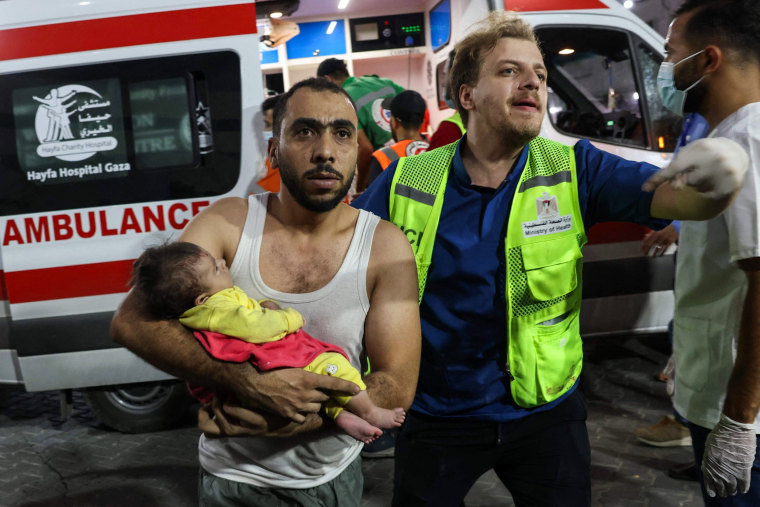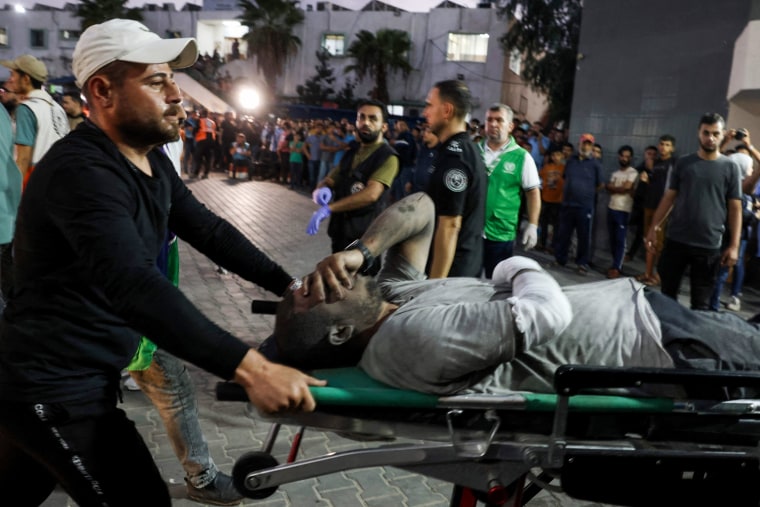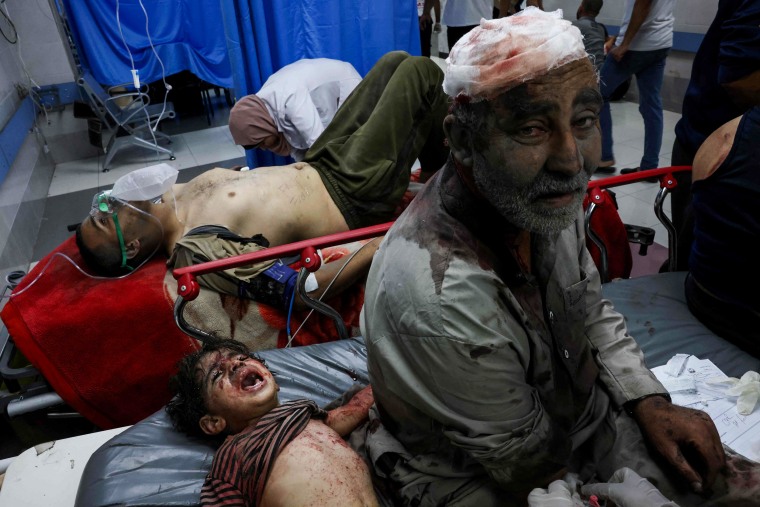GAZA CITY, Gaza — Om Hamza Mesleh, 45, was searching desperately for her son when she saw a young man carrying a body draped in bloodied white plastic.
“This is Hamza!” he shouted.
Panting, Om Hamza, a common honorific in Arabic for matriarchs that translates to “mother of Hamza,” rushed to see whether it was, indeed, her lost son.
She couldn’t hold back her tears when she saw his face.
“My children were playing in front of me inside the house. Suddenly, the floors above my head collapsed, and I could not find my children. I do not know how I got out. I looked for my children but did not find them,” Mesleh said.
After Hamas’ terrorist attack Saturday, Israeli airstrikes have reduced entire neighborhoods in Gaza, including hospitals, to soot. The remaining clinics and emergency units have been operating without power and supplies.
Follow along for live coverage
“Our hospitals are flooded with patients and injured people, and we have to deal with casualties that are arriving on a daily basis at our emergency department,” Marwan Abu Seeds, the deputy director of Al-Shifa Hospital in Gaza City, said as ambulances brought in one casualty after another.
On Saturday, Hamas — a militant organization that is one of the two major political groups in the Palestinian territories and has been designated a terrorist group by the U.S., the European Union and other countries — launched a terrorist attack via land, air and sea that killed at least 1,200 people in Israel. Israeli Prime Minister Benjamin Netanyahu said the terrorists raped women and butchered people.
Israel has responded by bombarding the enclave, and on Monday, Israeli Defense Minister Yoav Gallant ordered a “full siege” of Gaza, blocking food, gas and power into the area. Officials say at least 1,100 people have died in Gaza in bombings since the attack. Now, as Israel's forces prepare for a possible ground invasion, doctors and aid workers say the health care system in Gaza is about to collapse.
“The situation is really catastrophic,” said Sarah Chateau, a Paris-based desk manager for Doctors Without Borders, which has 300 staff members in Gaza. “We barely can operate in Gaza. The bombing is almost nonstop.”
Dr. Ghassan Abu-Sittah had been in Gaza City for less than 48 hours when he operated on “Unknown Child No. 6.”
“Half his face is missing,” Abu-Sittah told NBC News just moments after he finished the three-hour operation. “The whole time you’re thinking this is someone’s baby boy. We don’t know his name. You don’t know what happened to the rest of his family. We lost count of people now. We don’t know who’s who.”
When he heard about Hamas’ terrorist attack, Abu-Sittah, a plastic and reconstructive surgeon based in London, packed his bags and made his way to Gaza, where he has family.

“I knew what was about to happen,” he said. “I knew what the Gaza health system is capable of and what it’s not capable of.”
Abu-Sittah arrived in Gaza City on Monday. He specializes in treating war injuries, and he has traveled to Gaza to provide care after nearly every major conflict over the last 15 years.
After he evacuated to a shelter because rockets were hitting near his family’s home, he made his way to Al-Shifa Hospital.
“It looked like a refugee camp,” he said: It was filled with families taking shelter, he said, hoping it would be safe from bombings. Inside, it was already at capacity, filled with what he called “the tsunami of wounded.”
“They had already run out or are running out of supplies, especially consumables like gauze, antiseptic, sutures, blades and antibiotic ointment, things you need for burns,” he said.
Most of the patients at the hospital are in critical condition, said Seeds, the hospital’s deputy director, adding that many were injured when buildings collapsed and “the people on the streets have gotten shrapnels.”
Right now, there are so many people with serious injuries that others with lesser injuries are being forced to wait. Abu-Sittah said delaying care could lead to a higher risk of infection and permanent disability.
What has stuck with him most so far are the tiniest patients, the young children who are ending up in hospitals. Half of the Palestinians living in Gaza are younger than 19.
Gaza has the highest percentage of pediatric war injuries in the world, said Abu-Sittah, who wrote a textbook on the topic.
“This is the worst place to be a child,” he said.
At the Doctors Without Borders clinic, all of the patients were children 10 to 14 years old, Ayman Al-Djaroucha, the group’s project coordinator in Gaza, said in an email. “The majority of the injured in Gaza are women and children, since they are the ones who are most often in the houses that get destroyed in the airstrikes,” Al-Djaroucha said.
Doctors and aid workers say health care in Gaza was already at a crisis point before the war started. The tiny enclave regularly faces shortages of medical supplies and drugs. Cancer patients, for example, must leave Gaza for treatments like radiation — and leaving requires special permits and permission from the Israeli government, according to humanitarian groups.
Dr. Zaher Sahloul, a Chicago-based pulmonary and critical care specialist who runs the nonprofit organization MedGlobal, said he was supposed to go to Gaza next week. The organization sends teams of physicians to countries in need.

Sahloul said that last week, before the war started, there was already an urgent call for dialysis supplies. Now, with no supplies getting into the area, he estimated that Gaza will completely run out in two to three days.
“Patients with dialysis, they will stop getting treatment, and they will die,” he said. “After one week, if you are a renal failure patient, you will die.”
Hospitals across the Gaza Strip have been operating mostly on diesel generators, with electricity available for only three to four hours a day.
But Gaza’s Energy Ministry spokesman, Muhammad Thait, said that the energy plant stopped working Wednesday after it ran out of fuel and that there was no alternative electricity source left in Gaza.
Seeds said “we are in bad need of fuel” at Al-Shifa.
That left 2.2 million Gaza residents with only generators as sources for power, and the diesel to operate them is in acute shortage. The World Health Organization said Tuesday it is expected that fuel will run out in a matter of days.
“You’re going to have a lot of people dying unnecessarily and a lot of mental health trauma among providers, because they cannot save everyone,” Sahloul said.
The World Health Organization’s director general met Tuesday with Egyptian President Abdel Fattah El-Sisi, who agreed to facilitate a delivery of health and humanitarian supplies through the country’s border crossing into Gaza, provided Israel allows safe passage.
The WHO said in a statement: “They have exhausted the supplies WHO pre-positioned before the escalation. The life-saving health response is now dependent on getting new supplies and fuel to health care facilities as fast as possible.”
Mesleh, the mother, said about 70 people were inside the building she lives in at the time of the attack.
“My other son is wounded, and my daughter is, as well,” she said. “They are all in the hospital.”
Much of the medical staff has not left the hospital for days, working around the clock to treat the wounded, like Mesleh’s children. With ambulances and nearby buildings coming under aerial attack, emergency staff members said accessing services was becoming a gamble for patients.
“He is a martyr, by the will of God, he is a martyr,” said Hamza’s father, Mohamed Mesleh, who then helped lift his son’s body into an ambulance.
It arrived at Al-Shifa Hospital, where babies and their mothers sat on the crowded floor, waiting for their loved ones to be treated.

At area clinics, like the makeshift Doctors Without Borders clinic in Gaza City, emergency doctors treated dozens of victims all day long.
“Two days ago, we had a young patient, about 8 or 9 years old, who was in the vicinity of an aerial strike,” Dr. Justin Dalby said. “He sustained severe burns across the face, the chest and upper arms on both sides of his body.”
He said the boy had nowhere to go after an airstrike flattened his building.
Patients’ recoveries could take months, he said, with rampant risks of infection and no clean water.
Leo Cans, the head of mission for Doctors Without Borders in Palestinian Territories, which provided medical aid and surgical teams at Gaza hospitals, said: “One of the hospitals we support was hit by an airstrike and damaged. Another airstrike destroyed an ambulance carrying the wounded, right in front of the hospital where we work.”
The Gaza City clinic opened Sunday, and doctors like Dalby were performing highly complicated operations under some of the worst conditions they had ever seen, they said.
While patients try to recover in previously unfathomable conditions, their loved ones are finding that their own roads to recovery are also just beginning.
“We don’t know where to go now. Our homes are destroyed, and there is no shelter in which we can stay. We have no involvement in Hamas, Fatah or any other organization,” said Mesleh, the mother, referring to the Palestinian authorities in Gaza and the West Bank. “Suddenly, the building fell on my head and my children’s heads.”
